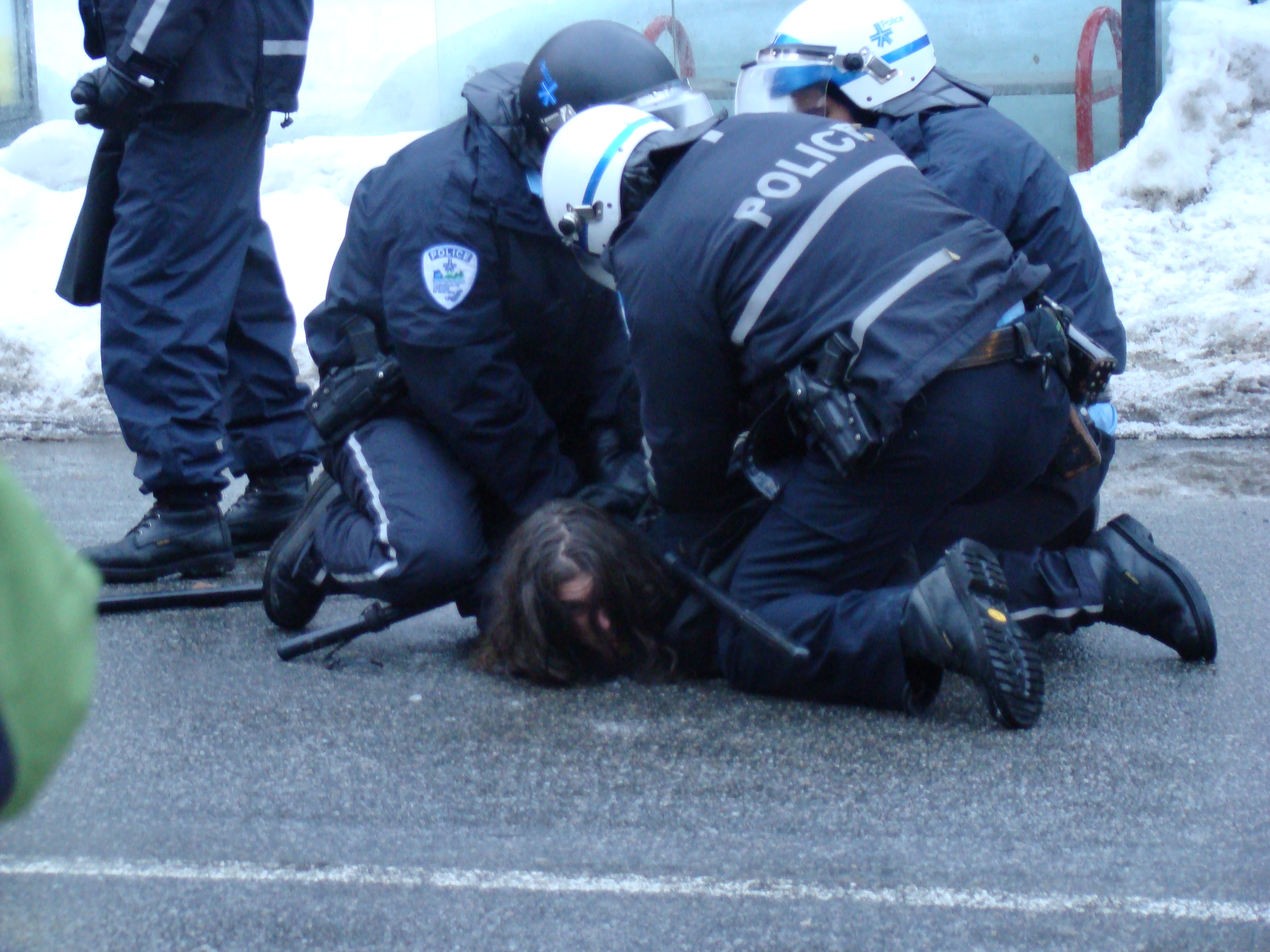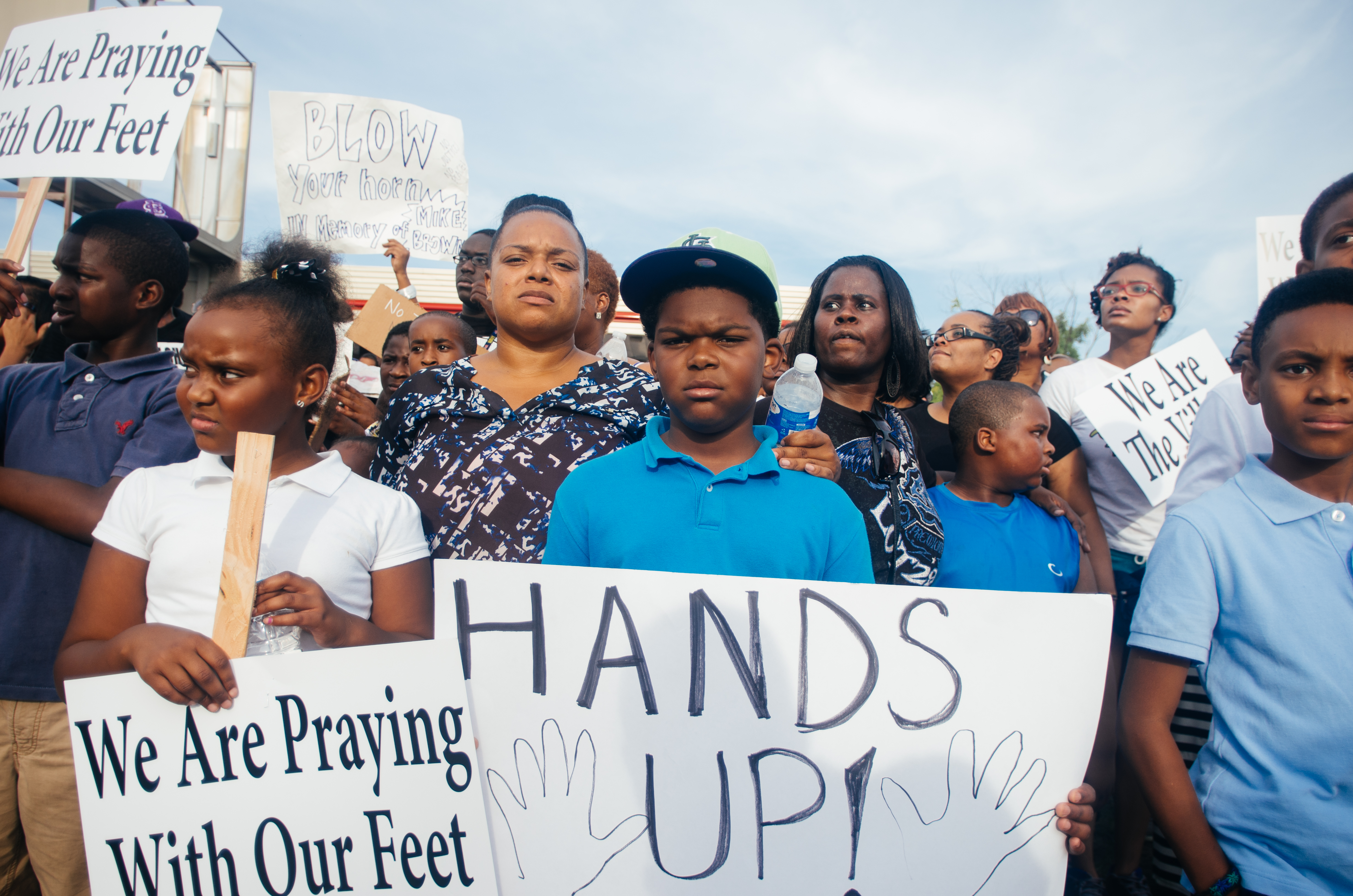|
International Day Against Police Brutality
The International Day Against Police Brutality occurs on March 15. It first began in 1997 as an initiative of the Montreal-based Collective Opposed to Police Brutality and the Black Flag group in Switzerland. A march is held yearly in Montreal. Acceptance of March 15 as a focal day of solidarity against police brutality varies from one place to another. In the United States, the October 22 Coalition to Stop Police Brutality, Repression, and the Criminalization of a Generation, a group mounted by the RCP has succeeded in building support for October 22 (also known as O22) as National Anti Police Brutality Day since 1995. See also * Copwatch * Legal observer * Black Lives Matter Black Lives Matter (abbreviated BLM) is a decentralized political and social movement that seeks to highlight racism, discrimination, and racial inequality experienced by black people. Its primary concerns are incidents of police br ... References External links Police Brutality W ... [...More Info...] [...Related Items...] OR: [Wikipedia] [Google] [Baidu] |
Collective Opposed To Police Brutality
Collective Opposed to Police Brutality (C.O.B.P), also known as Collectif Opposé à la Brutalité Policière, is an autonomous group founded in Montreal in 1995. This organization consists of victims, witnesses, representatives of ethnic communities, marginalized youth, small political groups, the homeless, sex workers, LGBTQ+, drug users, and others who have questions about police authority. History The C.O.B.P. was founded in 1995 following a protest regarding abortion rights. The protest occurred on August 19, 1995, when Human Life International (HLI), a Catholic pro-life organization, visited Montreal, Quebec. An anti-HLI demonstration was organized by a coalition of nearly 2,500 people, including those representing eighty separate organizations. Of the thousands of demonstrators, many were arrested, including the soon-to-be founders of the C.O.B.P. C.O.B.P's committee concentrates its efforts in the Montreal region and the collective's work includes: informing people of th ... [...More Info...] [...Related Items...] OR: [Wikipedia] [Google] [Baidu] |
Anarchist Flag
Anarchists have employed certain symbols for their cause, including most prominently the circle-A and the black flag. Anarchist cultural symbols have been prevalent in popular culture since around the turn of the 21st century, concurrent with the anti-globalization movement. The punk subculture has also had a close association with anarchist symbolism. Flags Red flag The red flag was one of first anarchist symbols and it was widely used in late 19th century by anarchists worldwide. Peter Kropotkin wrote that he preferred the use of the red flag. Use of the red flag by anarchists largely disappeared after the October Revolution, when red flags started to be associated only with Bolshevism and communist parties and authoritarian, bureaucratic and reformist social democracy, or authoritarian socialism. Black flag The black flag has been associated with anarchism since the 1880s, when several anarchist organizations and journals adopted the name ''Black Flag''. How ... [...More Info...] [...Related Items...] OR: [Wikipedia] [Google] [Baidu] |
Montreal
Montreal ( ; officially Montréal, ) is the second-most populous city in Canada and most populous city in the Canadian province of Quebec. Founded in 1642 as '' Ville-Marie'', or "City of Mary", it is named after Mount Royal, the triple-peaked hill around which the early city of Ville-Marie is built. The city is centred on the Island of Montreal, which obtained its name from the same origin as the city, and a few much smaller peripheral islands, the largest of which is Île Bizard. The city is east of the national capital Ottawa, and southwest of the provincial capital, Quebec City. As of 2021, the city had a population of 1,762,949, and a metropolitan population of 4,291,732, making it the second-largest city, and second-largest metropolitan area in Canada. French is the city's official language. In 2021, it was spoken at home by 59.1% of the population and 69.2% in the Montreal Census Metropolitan Area. Overall, 85.7% of the population of the city of Montre ... [...More Info...] [...Related Items...] OR: [Wikipedia] [Google] [Baidu] |
Police Brutality
Police brutality is the excessive and unwarranted use of force by law enforcement against an individual or a group. It is an extreme form of police misconduct and is a civil rights violation. Police brutality includes, but is not limited to, beatings, shootings, "improper takedowns, and unwarranted use of tasers." History The origin of modern policing can be traced back to 18th century France. By the 19th and early 20th centuries, many nations had established modern police departments. Early records suggest that labor strikes were the first large-scale incidents of police brutality in the United States, including events like the Great Railroad Strike of 1877, the Pullman Strike of 1894, the Lawrence Textile Strike of 1912, the Ludlow Massacre of 1914, the Great Steel Strike of 1919, and the Hanapepe Massacre of 1924. The term "police brutality" was first used in Britain in the mid-19th century, by '' The Puppet-Show'' magazine(a short-lived rival to ''Punch'') in S ... [...More Info...] [...Related Items...] OR: [Wikipedia] [Google] [Baidu] |
Revolutionary Communist Party, USA
The Revolutionary Communist Party, USA (also known as RCP and The Revcoms) is a communist party in the United States founded in 1975 and led by its chairman, Bob Avakian. The party organizes for a revolution to overthrow the system of capitalism and replace it with a socialist state, with the final aim of world communism. The RCP is frequently described as a cult, a characterization to which it strongly objects. History 1960s–1970s In early 1968, Avakian, Leibel Bergman, H. Bruce Franklin, Stephen Charles Hamilton and a score or so others—comprising both veterans of the Communist Party USA and Bay Area radicals based in Palo Alto, Berkeley, and San Francisco, formed the Bay Area Revolutionary Union (BARU). Among the BARU's first tasks was to challenge the Maoist Progressive Labor Party (PLP) over its positions on the Black Panther Party, the Chinese Cultural Revolution and the direction of Maoism. The early RU joined with the Revolutionary Youth Movement faction in the Stu ... [...More Info...] [...Related Items...] OR: [Wikipedia] [Google] [Baidu] |
National Anti Police Brutality Day
National may refer to: Common uses * Nation or country ** Nationality – a ''national'' is a person who is subject to a nation, regardless of whether the person has full rights as a citizen Places in the United States * National, Maryland, census-designated place * National, Nevada, ghost town * National, Utah, ghost town * National, West Virginia, unincorporated community Commerce * National (brand), a brand name of electronic goods from Panasonic * National Benzole (or simply known as National), former petrol station chain in the UK, merged with BP * National Car Rental, an American rental car company * National Energy Systems, a former name of Eco Marine Power * National Entertainment Commission, a former name of the Media Rating Council * National Motor Vehicle Company, Indianapolis, Indiana, USA 1900-1924 * National Supermarkets, a defunct American grocery store chain * National String Instrument Corporation, a guitar company formed to manufacture the first reson ... [...More Info...] [...Related Items...] OR: [Wikipedia] [Google] [Baidu] |
Copwatch
Copwatch (also Cop Watch or Cop-Watch) is a network of activist organizations, typically autonomous and focused in local areas, in the United States, Canada and Europe that observe and document police activity while looking for signs of police misconduct and police brutality. They believe that monitoring police activity on the streets is a way to prevent police brutality. The stated goal of at least one Copwatch group is to engage in monitoring and videotaping police activity in the interest of holding the police accountable in the events involving assaults or police misconduct. They also develop theoretical and practical approaches to security and justice structures to replace the police (abolitionism). They practice an intersectional critique of capitalism and analyze crime as a consequence of social problems that cannot be fought by surveillance and punishment. Therefore, they demand social solutions especially in relation to violence in structural power relations (sexist, rac ... [...More Info...] [...Related Items...] OR: [Wikipedia] [Google] [Baidu] |
Legal Observer
Legal observers are individuals, usually representatives of civilian human rights agencies, who attend public demonstrations, protests and other activities where there is a potential for conflict between the public or activists and the police, security guards, or other law enforcement personnel. The purpose of legal observers is to monitor, record, and report on any unlawful or improper behaviour. Legal or human rights observers act as an independent third party within a conflictual civil protest context, observing police behaviour in order to keep police accountable for their actions. Legal observers can write incident reports describing police violence and misbehaviour and compile reports after the event. The use of video and still cameras, incident reports and audio recorders is common. History It is thought that the concept of using legal observers first emerged during protests in the 1930s in the East End of London, where police agents provocateur were used during protests b ... [...More Info...] [...Related Items...] OR: [Wikipedia] [Google] [Baidu] |
Black Lives Matter
Black Lives Matter (abbreviated BLM) is a decentralized political and social movement that seeks to highlight racism, discrimination, and racial inequality experienced by black people. Its primary concerns are incidents of police brutality and racially motivated violence against black people. It started following the killings of Trayvon Martin, Michael Brown, Eric Garner, Pamela Turner and Rekia Boyd, among others. The movement and its related organizations typically advocate for various policy changes considered to be related to black liberation. While there are specific organizations that label themselves simply as "Black Lives Matter," such as the Black Lives Matter Global Network, the overall movement is a decentralized network of people and organizations with no formal hierarchy. The slogan "Black Lives Matter" itself remains untrademarked by any group. Despite being characterized by some as a violent movement, the overwhelming majority of its public demo ... [...More Info...] [...Related Items...] OR: [Wikipedia] [Google] [Baidu] |
March Observances
March is the third month of the year in both the Julian and Gregorian calendars. It is the second of seven months to have a length of 31 days. In the Northern Hemisphere, the meteorological beginning of spring occurs on the first day of March. The March equinox on the 20 or 21 marks the astronomical beginning of spring in the Northern Hemisphere and the beginning of autumn in the Southern Hemisphere, where September is the seasonal equivalent of the Northern Hemisphere's March. Origin The name of March comes from '' Martius'', the first month of the earliest Roman calendar. It was named after Mars, the Roman god of war, and an ancestor of the Roman people through his sons Romulus and Remus. His month ''Martius'' was the beginning of the season for warfare, and the festivals held in his honor during the month were mirrored by others in October, when the season for these activities came to a close. ''Martius'' remained the first month of the Roman calendar year perhaps as l ... [...More Info...] [...Related Items...] OR: [Wikipedia] [Google] [Baidu] |




